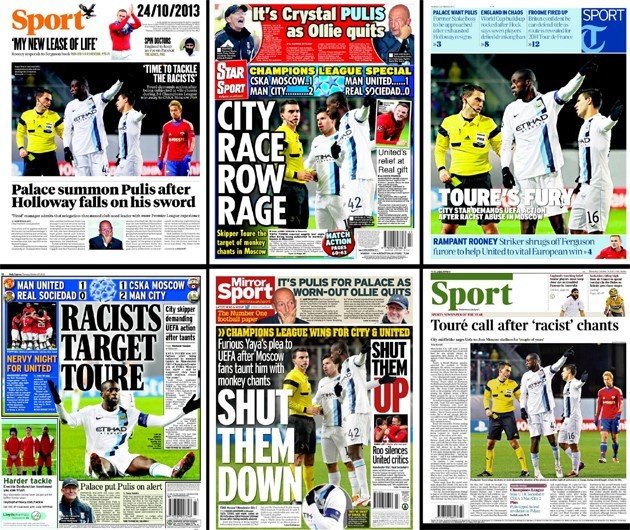Opinion
All SportsShocks of the Year #4: The racism storm that engulfed football
:focal(154x147:156x145)/origin-imgresizer.eurosport.com/2015/03/26/1443764-30872247-310-310.jpg)
Published 05/05/2015 at 16:44 GMT
This year, sport has been rocked by a string of incredible happenings across all sports.
Eurosport
Image credit: Eurosport
The Rundown has picked out the biggest seven stories among the multitude of scandals, surprises, outrages, revelations and horrors that we've seen in 2013, and will be counting them down between Christmas and New Year.
- - -
Shocks of the Year #4: The racism storm that engulfed football

After the John Terry and Luis Suarez cases marred football in 2012, hopes were high that 2013 would mark an upturn in football's efforts to eradicate racism.
Just three days into the year, those hopes were in tatters. AC Milan's Kevin-Prince Boateng was subjected to abuse so vicious during a friendly match against Pro Patria that he kicked the ball into the stands, tore his shirt off and walked off the pitch in protest.
Everyone from Sepp Blatter downwards joined in the chorus of voices decrying the racists. The mayor of Pro Patria announced that they would sue the fans responsible for ruining the friendly match just 26 minutes in.
There have been efforts to tackle the problem: in the FA has launched a task force to look at ways of tackling racism - with referees such as Howard Webb asked for their opinions and suggestions about how to act when chanting begins – and even a smartphone app making it easier for fans and players to report instances of racism in the game. UEFA has also come down hard at times on clubs whose fans have been found guilty of racist chanting, with CSKA Moscow, Dinamo Moscow and Lazio among those handed fines and forced to play in empty stadiums as punishment.
Yet for every step forward, there is a step back: Paul Elliott (pictured above), a former Chelsea star who has been awarded the CBE for his work tackling discrimination in English football, was forced to resign from his prominent position at the FA after he called a former business associate a "n*****" in a text message. And then there was UEFA which - despite a statement insisting that the fight against discrimination is a "high priority", and that they will enforce a "zero-tolerance" policy – drastically softened its sanctions against Lazio after an appeal. That despite the fact that the chanting aimed at Legia Warsaw players was just the latest in a string of appalling racist incidents perpetrated by the club's far-right fans, who have targeted fans and players from Juventus, Tottenham and Borussia Moenchengladbach in the previous year.
It's all unutterably depressing stuff. A look through Eurosport's records reveals almost a story a day about some new racist incident or other in the game, something which leads to the worst possible knock-on effect of the lot: the righteous anger that must fuel anti-racism efforts is slowly being eroded, and replaced by the indifference born out of sheer news fatigue. The red herrings don't help: the craziness over Roy Hodgson's famously ill-advised and poorly explained "feed the monkey" joke at half-time during an England match, or Adrian Chiles getting hauled over the coals for referring to the fact that the builders currently working on his home were Polish.
Discrimination in the game is anything but funny, yet the the indifference and resignation that has been bred by a constant string of incidents led to one of the most surprising twists of all: the moment when a man who should know better – John Barnes – to suggest that it is "pointless and ridiculous" to worry about well-paid footballers getting abused.
Yes, there are far bigger issues in the fight against racism than occasional abuse of players. But as this very website argued in the wake of Barnes's words, to say that it tackling racism in the game is meaningless is to underestimate the power of sport, and a failure to realise sport's potential to take a lead in society.
Nelson Mandela always credited sport as one of the key factors in South Africa's emergence: the boycotts were instrumental in undermining the Apartheid system, while South Africa's subsequent successes as the newly-created Rainbow Nation were critical in healing the wounds of the nation. If sport has the power to help transform such a bitterly divided nation as South Africa in the 1990s, then surely it is part of the solution for the ills of Britain in the 2010s.
Toby Keel
Scan me
Related Topics
Share this article
Advertisement
Advertisement